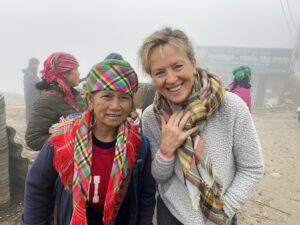
Bonded – same earrings!
“There she is!”
I follow my son Miles, daughter-in-law Erin and two grandkids, Olive and Quincy, across the hotel lobby. That’s what I do on this trip to Viet Nam. Just follow.
“Hi Sue!” A small Asian woman turns her head, which is wrapped in a bright yellow plaid bandana, and smiles. Her face is broad, her skin a little darker than other Vietnamese. Long black hair rolls down her shoulder over another red plaid scarf. She wears black velvet “culotte” style pants that end at her knees and explains this is why her clan is called “Black” Hmong. Not the skin – it’s the clothes. A beautifully hand-embroidered purse is slung cross-body over her jacket.
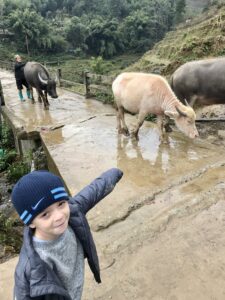
Quincy, my traveling buddy.
We are joined by five other Hmong women on the walk downhill. They did not speak English, and Sue told us later that it was not just coincidence. They had wares to sell, and we might buy. But I soon fell into their easy pace and laughed with them as we compared jewelry (we all wore large silver hoop earrings) and asked through Sue how many children they had, a common denominator for all women.
I understood why they wore rubber boots once we hit the dirt part of the trail. Slick mud between rocks and tree roots made me slow way down, my knee protesting. I felt as graceful as a water buffalo. Maybe less. To my right, a woman my age followed closely, then put out her hand. I took it, grateful for the help– it was warm and rough like my husband’s carpenter hands, the callouses proof of hard labor, and the fingertips blue from dying hemp fabric with indigo. She stayed beside me, nodding and grinning as she reached for my hand several times along the slippery trail until we reached the valley. “Thank you” seems to be a universal language. And I bought a scarf from her too.
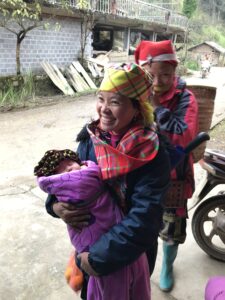
Sue
This whole idea of needing assistance as I age is disconcerting. It’s that strange warble under your feet – a subtle shift that calls for attention. Years of pride and self-sufficiency have kept me on the giving end, not the take. Bathing, walking, lifting, and sometimes just holding so many sick and wounded people throughout the last 30-odd years of being a nurse have left me one-sided. I’m the God- Sent, the servant. Yet lately, as I gaze upon a helpless and distraught sack of aging organs and bones in the hospital bed before me, I see more of me.
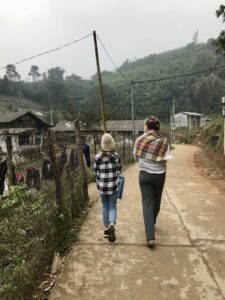
With Olive, Hmong village.
“I never thought this would be me.”
“Everything changes in a moment!”
“I hate being so helpless!”
I’ve heard this so often. And I confess I was laid out flat when I lost my son, helpless to dress, drive or read a recipe. I know heartbrokenness. But this slow train of aging, like an old car with idiot lights flashing on the dashboard, is a new journey. Now I hold the small coarse hand of a woman my age on the other side of the planet. I’m glad no one at work can see me. But I notice my family smiling.
New Years Day. We are on a cable car heading up to Mount Fansipan, also known as the Roof of Indochina. The car is filled with about 12 people from different parts of the world, but when we burst through the clouds into the cobalt blue sky, an audible gasp of wonder and joy stirs the crowd. We are above the clouds. Peaks of dark green mountain caps peek through, and soon we disembark into a small building serving hotdogs on sticks, sweet popcorn and photographs. Outside we are greeted by several staircases which lead to the summit, barely visible. Okay. I got this.
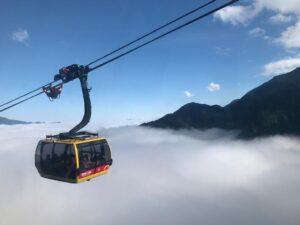 The knees work better going up than down. We’ll deal with down later. I grab a rail and head upward, becoming aware as I climb that I am lightheaded. Thin air, less oxygen. Okay Robin, slow down. No race here. But as I reach the terrace before the next tall flight of stairs, my vision begins to narrow and I can’t breathe. I look over at Miles.
The knees work better going up than down. We’ll deal with down later. I grab a rail and head upward, becoming aware as I climb that I am lightheaded. Thin air, less oxygen. Okay Robin, slow down. No race here. But as I reach the terrace before the next tall flight of stairs, my vision begins to narrow and I can’t breathe. I look over at Miles.
“I think I need to sit,” I say casually. He grabs my arm and walks me to a bench.
“Are you okay mom?”
“Just a little dizzy. The air’s thin up here.” I’m hoping he doesn’t notice that I seem to be the only one getting ready to pass out. Erin and the grandkids each round on me, concern on their sweet faces until I say, “I’m better. Let’s go.”
“No mom. You stay here.” I could tell it was not debatable. “Brooke will keep you company.” My sweet teenage granddaughter takes a seat beside me, as we watch the rest of the party head up another staircase.
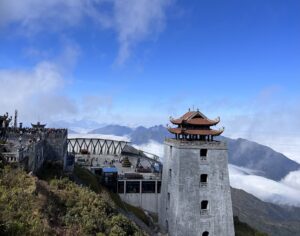
Mount Fansipan
“Do you want a hotdog?” I offered.
“Sure!” Brooke smiled. “Thanks Ama.”
We are content. If she was disappointed that she couldn’t make the final ascent, she did not show it. I knew she wouldn’t. We watch a wave of tourists, mostly Asian, parade by, selfie sticks waving in the air. It was New Year’s Day, it was a good start and I pressed our unplanned time together on Mount Fansipan into my heart. It was a God-treasure, just to be beside my teenage granddaughter. This is why I sit on a jet for 21 hours.
Eventually, the crew descended and gathered around us. Only Erin and Olive made it to the summit. Quincy, who Miles correctly assessed as being about as stalwart at age six as his 66-year-old grandmother, had given up after the second set of stairs, although for him, I think climbing stairs became meaningless. The top offered no reward, other than saying you did it, and a glimpse at a big Buddha statue. Joyfully, we head back to the cable car station.
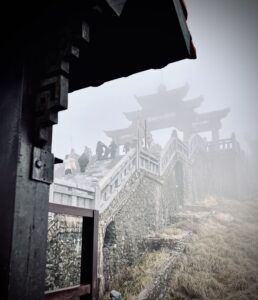
Lots of stairs. 650 but who’s counting?
I could sense Miles watching me. I felt better, I knew I had to take it slow. I grabbed the railing and looked down the long stone staircase, smooth from so many determined feet over the years. The steps were high so I held the rail tighter, knowing I couldn’t trust my right knee. Then I noticed my son beside me, his arm extended. My first thought, I don’t need any help. Then before the second thought took shape, I looped my arm through his and took my first step down.
“I feel better now,” I said, just to maintain my good standing as his mother who is always just fine. He turned and looked into my eyes.
“You’d lie if you didn’t.” There was just a shadow of a smile. I said nothing. Looking down, I took another step, holding his arm tightly.
The clouds moved swiftly across the mountain range. Sometimes we were standing in one, and then the next minute you could see so clearly – the mountains huddling around the small town of Sapa, more rice paddies chiseled in even terraces around the sides. And if you looked real close, there was a farmer, maybe a water buffalo, or children splashing in the mud. Then it was gone, like holding hands with a Hmong woman my age and sharing a hotdog on a stick with my granddaughter. Or letting my son take care of his mother. Love can be a cloud, sometimes obscuring what we think we know on purpose, and we need help. It does more than give. It has to take – it has to humbly bow to seasons and circumstance.
Love is not proud. 1 Corinthians 13:4
Do I need to mention that it also has to do more than take? It isn’t perfect love until it’s a full circle. My hand that has reached out to grab a falling toddler, to feel a feverish brow, to wipe away tears may have to reach for another hand. A stronger one.
This year, no resolutions. But a good revelation to start with. And you don’t have to travel to the Roof of Indochina to learn this.
But maybe I did.
To everything there is a season, and a time to every purpose under the heaven: Ecclesiastes 3:1
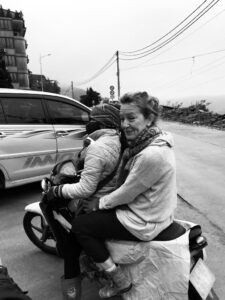
Happy New Year! Stupid knee.
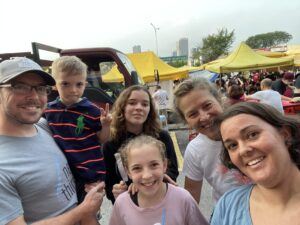
The whole crew – Malaysian street market
And cool video of the cable car here:
